Fleurs du Mal Magazine


Or see the index

Dromen
Zij laat haar adem op en neer en hen
de wereld dromen. Past daarin met
grage handen bloemetjesjaponnen.
Hij kucht, verlegt zijn hart naar rechts
en voelt het spinnen van hun rosse kater.
Zij ligt nabij aan verre kusten naar de zon
te lonken. Ze slapen samen, delen leven
en verworven smart. Op kastjes troost
van foto’s in hun zilveren ovalen. Ze
wuiven naar elkaar met dichte ogen,
vingers verstrengeld. De wekker tikt
geruchten stil als dode torretjes.
Bert Bevers
Dromen
Uit: Onaangepaste tijden, Zinderend, Bergen op Zoom, 2006
•fleursdumal.nl magazine
More in: Archive A-B, Archive A-B, Bevers, Bert
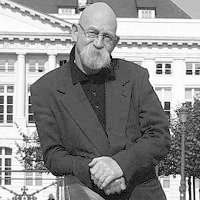
Notitie uit The Dallas School
Book Depository, Texas
Lee Harvey Oswalds dagboekaantekening van 22 november 1963
Vandaag is onze Audrey al 33 dagen! Er zijn niet
heel veel mannen die hun kinderen en kleinkinderen
kunnen vertellen dat zij ooit hun president in levenden
lijve hebben aanschouwd. Het uitzicht op Dealey Plaza
is hier weids. Blij met mijn baantje, en mijn pauze.
Wie krijgt er nu de kans zoiets van zo nabij te zien? Oei,
ik laat een boer. Die cola was wel lekker maar ik dronk
net iets te snel. Daar buigt de stoet mijn richting op.
Ik zie hem zwaaien. Nooit eerder zag ik zulk roze als
dat van Jackie’s pakje. Aan dergelijke kleuren moeten
moeten ze hier wennen. Ze lijkt welhaast een Parisienne.
Op de gazons daar wuiven brave – wat hoor ik nou voor
koud geluid? Het doorladen van een wapen hier vlakbij?
En….Hé, ginds op die brug glanst de zon op een vizier.
Wie zijn dat? Waarom schouderen die gasten hun geweer?
Verrek….
Bert Bevers
Notitie uit The Dallas School
Book Depository, Texas
Lee Harvey Oswalds dagboekaantekening van 22 november 1963
Uit: Bedekte termen, Stabilitas loci, Antwerpen, 2023
•fleursdumal.nl magazine
More in: Archive A-B, Archive A-B, Bedekte Termen, Bevers, Bert, CRIME & PUNISHMENT

Rapper
De oude dichter droomde. Hij sprak niet meer
maar pleegde spoken word. Het was gebeurd
voor hij er erg in had. Hij stiet zijn verzen, nat
van ’t bedenken nog, verbeten in een microfoon,
allengs rapper. Hij had voor papier geen vrees,
alleen een kleine stem die groter wilde lijken.
Bert Bevers
Rapper
Uit: Bedekte termen, Stabilitas loci, Antwerpen, 2023
•fleursdumal.nl magazine
More in: Archive A-B, Archive A-B, Bedekte Termen, Bevers, Bert

Roep uit dan!
Verticale streepjes met een puntje eronder noemt
men uitroeptekens. Roep uit, roep uit, roep uit dan
vriendjes! Tuimel over geestdrift, en liefde voor
boeken vol vogels. Het mag allemaal. Geen sprake
van versagen. Accentueer de koenheid van de x
in een woord als larynx! Richt heel je lengte
op het slot van zinnen met voldongen feiten: !!!!
Bert Bevers
Roep uit dan!
Uit: Eigen terrein, Uitgeverij WEL, Bergen op Zoom, 2013
•fleursdumal.nl magazine
More in: Archive A-B, Archive A-B, Bevers, Bert

Welgemutst
De lessen zijn gedaan. De tram stroomt vol uniform.
Vol bewegingsdrang, zoals een vis is, kleine jeugd
alom plotsklaps. Jongens willen wijsjes en meisjes
schoentjes. Daar horen zoentjes bij. Al is het maar
in gedachten. Zie ze eens naar de toekomst groeien.
Ze snuiven fris. En lachen elkaar zacht toe, broos
als het marsepeinen gezicht van de mutslangoer.
Bert Bevers
Welgemutst
Gedicht
Uit: Eigen terrein, Uitgeverij WEL, Bergen op Zoom, 2013
•fleursdumal.nl magazine
More in: Archive A-B, Archive A-B, Bevers, Bert
Available for the first time in paperback, How To Be Invisible collects the seminal lyrics of Kate Bush, selected by the artist and brought together in a beautiful edition with cover artwork from Jim Kay.
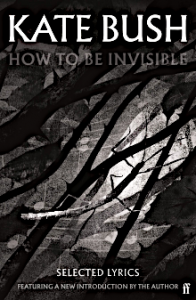 Selected and arranged by the author, How To Be Invisible presents the lyrics of Kate Bush in a beautiful new paperback edition featuring a new cover by illustrator Jim Kay.
Selected and arranged by the author, How To Be Invisible presents the lyrics of Kate Bush in a beautiful new paperback edition featuring a new cover by illustrator Jim Kay.
‘The greatest singer-songwriter of the past 40 years, whose work is complex, ethereal and filled with so many secrets that one can listen to the albums for decades and still discover new delights every time[…] there’s not a spare word anywhere in Bush’s work. Everything means something.’ – Irish Times
Kate Bush is an English singer, songwriter, musician, dancer and record producer. Rising to prominence with her debut single ‘Wuthering Heights’, she has released ten studio albums, all of which have charted in the UK Top Ten. She has been nominated for thirteen Brit Awards, winning for Best British Female Artist in 1987, and has been nominated for three Grammy Awards. In 2002 she received an Ivor Novello Award for Outstanding Contribution to British Music, was appointed a CBE in the 2013 New Years Honours, and was twice-nominated for induction into the Rock and Roll Hall of Fame. How to Be Invisible, a collection of Bush’s lyrics, was published by Faber & Faber in 2018 and was a Rough Trade and Belfast Telegraph Book of the Year.
How To Be Invisible
Kate Bush (author)
New introduction by Kate Bush
Language: English
Paperback
224 Pages
Published: 06/04/2023
Publisher: Faber & Faber
ISBN-13: 9780571383023
ISBN-10: 0571383025
Number of pages: 224
$19.95
• fleursdumal.nl magazine
More in: #Editors Choice Archiv, - Book News, - Bookstores, Archive A-B, Archive A-B, AUDIO, CINEMA, RADIO & TV, DANCE & PERFORMANCE, Kate Bush
Holland Festival’s associate artist ANOHNI presents a mixed media exhibit: SHE WHO SAW BEAUTIFUL THINGS.
The installation includes a series of portraits honoring ANOHNI’s former collaborator Dr. Julia Yasuda, taken by Julia’s late wife Erika Yasuda in Tokyo in the early 1980s, and exhibited here for the first time.
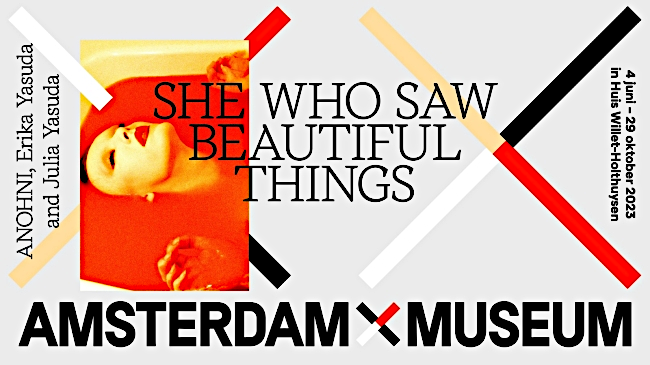
Erika Yasuda’s portrets: Within the collection of the Huis Willet-Holthuysen in the centre of Amsterdam, ANOHNI layers photos, silkscreened fabrics, sculpture, video, sound and paintings from her own artistic practices within a selection of Erika Yasuda’s extraordinary portraits. The works reflect an insular and delicately composed vision of enlightened femininity and luxuriant androgyny, persevering in memory despite historical and ongoing existential threats.
ANOHNI: ‘I like the concept of ‘animism’ – that everything is alive, in an ongoing a process of transformation -and that all materiality is imbued with a certain presence, even a sense of memory that we might not entirely understand. I work with veils as a way to suggest different layers of presense. Sometimes I imagine a cacophony of moments within a timeline in a certain space, as if they were all able to express their vitality simultaneously.’
About ANOHNI: Born in England, ANOHNI lives and works in America as a musician, visual artist and theater director. In 1995 she founded her performance group The Johnsons, with which she performed with symphony orchestras in opera houses around the world, including Sydney Opera House, the Royal Opera House in London, Teatro Real in Madrid and Carnegie Hall in New York.
ANOHNI has presented exhibitions of her visual work at the Nikolaj Kunsthal, Kunsthalle Bielefeld, The Hammer Museum, The Kitchen and Sikkema Jenkins Gallery in New York. She co-facilitated the art project FUTURE FEMINISM presented at The Hole, New York in 2014 and was part of ANOHNI’s artistic residency in Aarhus, European Capital of Culture in 2017.
The Willet-Holthuysen House: The imposing Willet-Holthuysen House is situated in the center of Amsterdam. The house on the Herengracht contains many period rooms. Its beautiful salons are in the style of Louis XIV, and the garden is symmetrically designed as a French formal garden.
Address: Herengracht 605, 1017 CE Amsterdam.
Open daily from 10 a.m. 5 p.m.
• https://www.amsterdammuseum.nl/
june 4 until october 29 – 2023
Willet-Holthuysen House – Amsterdam
• fleursdumal.nl magazine
More in: #Editors Choice Archiv, anohni = antony, Archive A-B, Archive A-B, Art & Literature News, AUDIO, CINEMA, RADIO & TV, Holland Festival, Photography
Like a long, funny letter from an old friend, an album of drawings by the legendary singer and activist for social justice, Joan Baez.
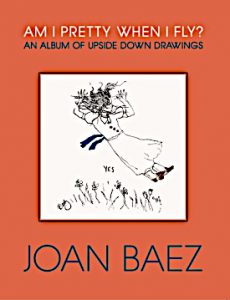 Since retiring from active performing, Baez has focused her formidable talents on painting and drawing. This collection of drawings shows another side of Baez: lovingly loose and charming sketches on reoccurring themes such as politics, relationships, women, animals, and family.
Since retiring from active performing, Baez has focused her formidable talents on painting and drawing. This collection of drawings shows another side of Baez: lovingly loose and charming sketches on reoccurring themes such as politics, relationships, women, animals, and family.
Each section, organized thematically, includes an introductory piece by the artist. Baez approaches her line drawings as exercises in freedom: she begins drawing upside down—often using her non-dominant hand—without any preconceived notion of where the lines might lead her.
Beginning with her seminal debut album in 1960, Baez has been a musical force of nature of incalculable influence whose earliest recordings fed a host of traditional ballads into the rock vernacular.
In 1963, she introduced Bob Dylan to the world, beginning a tradition of mutual mentoring that continued across her many recordings.
As a lifetime advocate for non-violent social change, she marched on the front line of the civil rights movement with Martin Luther King Jr., shined a spotlight on the Free Speech Movement, took to the fields with Cesar Chavez, organized resistance to the Vietnam War, and inspired Vaclav Havel in his fight for a Czech Republic.
Joan Baez is a dynamic force of nature. Her commitment to music and social activism has earned global recognition, ranging from induction into the Rock & Roll Hall of Fame, to the Ambassador of Conscience Award, Amnesty International’s highest honor. Retired from active performing since 2019, she has devoted much of her time to the “Mischief Makers” series of paintings, portraits that immortalize risk-taking visionaries she has known, who have brought about social change through history, from Dr. Martin Luther King and Bob Dylan to the Dalai Lama and Patti Smith.
Am I Pretty When I Fly?:
An Album of Upside Down Drawings
by Joan Baez
Publisher: David R. Godine
Published: 2023
Language: English
Hardcover
120 pages
ISBN-10: 567927548
ISBN-13: 978-1567927542
$40.50
• fleursdumal.nl magazine
More in: - Book News, - Bookstores, Archive A-B, Archive A-B, AUDIO, CINEMA, RADIO & TV, Bob Dylan, Joan Baez, Patti Smith

Vergeten krijgsgeheimen
Stadspoorten blijven toe. Wachters weifelen
over aandrift van legendes, vergeten ballingen.
Waarom weten zij precies wanneer de kraaien
gaan vertrekken? Eer heeft geen leeftijd, weten
zij. Ongeduld is een glazen harnas. Laat het leger.
Gulzig vreest de rook het doven van het vuur.
Bert Bevers
Vergeten krijgsgeheimen
Uit de bundel in voorbereiding: Bedekte termen
•fleursdumal.nl magazine
More in: Archive A-B, Archive A-B, Bedekte Termen, Bevers, Bert

Aanvang
Waaraan zou mijn moeder gedacht hebben
toen ze mij voor de eerste keer de borst had
gereikt? Waar ze aan begonnen was? Waar
ik aan begonnen was, beginnen ging? ‘Wordt
dit ook voor hem een herinnering?’ Ik wist
wel al dat vergeten nooit volledig lukken zal.
Bert Bevers
Aanvang
• fleursdumal.nl magazine
More in: Archive A-B, Archive A-B, Bevers, Bert
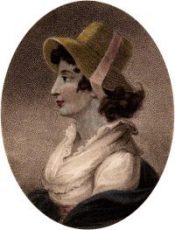
The Rights of Women
Yes, injured Woman! rise, assert thy right!
Woman! too long degraded, scorned, opprest;
O born to rule in partial Law’s despite,
Resume thy native empire o’er the breast!
Go forth arrayed in panoply divine;
That angel pureness which admits no stain;
Go, bid proud Man his boasted rule resign,
And kiss the golden sceptre of thy reign.
Go, gird thyself with grace; collect thy store
Of bright artillery glancing from afar;
Soft melting tones thy thundering cannon’s roar,
Blushes and fears thy magazine of war.
Thy rights are empire: urge no meaner claim,—
Felt, not defined, and if debated, lost;
Like sacred mysteries, which withheld from fame,
Shunning discussion, are revered the most.
Try all that wit and art suggest to bend
Of thy imperial foe the stubborn knee;
Make treacherous Man thy subject, not thy friend;
Thou mayst command, but never canst be free.
Awe the licentious, and restrain the rude;
Soften the sullen, clear the cloudy brow:
Be, more than princes’ gifts, thy favours sued;—
She hazards all, who will the least allow.
But hope not, courted idol of mankind,
On this proud eminence secure to stay;
Subduing and subdued, thou soon shalt find
Thy coldness soften, and thy pride give way.
Then, then, abandon each ambitious thought,
Conquest or rule thy heart shall feebly move,
In Nature’s school, by her soft maxims taught,
That separate rights are lost in mutual love.
Anna Laetitia Barbauld
(1743 – 1825)
The Rights of Women
Anna Laetitia Barbauld wrote this poem in 1793,
in response to Mary Wollstonecraft’s ‘A Vindication of the Rights of Woman´.
• fleursdumal.nl magazine
More in: # Classic Poetry Archive, Archive A-B, Archive A-B, Feminism, The Ideal Woman
Gabrielle Bates’s electric debut collection Judas Goat plumbs the depths of intimate relationships.
The book’s eponymous animal is used to lead sheep to slaughter while its own life is spared, its harrowing existence echoes through this spellbinding collection of forty poems, which wrestle with betrayal and forced obedience, violence and young womanhood, and the “forbidden felt language” of sexual and sacred love.
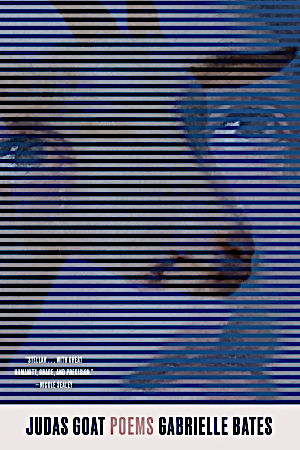
These poems conjure encounters with figures from scriptures, domesticated animals eyeing the wild, and mothering as a shapeshifting, spectral force; they question what it means to love another person and how to exorcise childhood fears. All the while, the Deep South haunts, and no matter how far away the speaker moves, the South always draws her back home.
In confession, in illumination, Bates establishes herself as an unflinching witness to the risks that desire necessitates, as Judas Goat holds readers close and whispers its unforgettable lines.
For a long time, the only part of my poems anyone praised
were the endings.
I didn’t mind.
The way I understood it, if the ending was good,
it cast goodness back over the whole.
I thought we could be saved at the last minute.
Gabrielle Bates is the author of the debut poetry collection Judas Goat (Tin House, 2023). Her work has appeared in the New Yorker, Poetry Magazine, Ploughshares, APR, Virginia Quarterly Review, New England Review, Gulf Coast, Mississippi Review, Black Warrior Review, the Best of the Net anthology, and BAX: Best American Experimental Writing, among other journals and anthologies, and her poetry comics have been featured internationally in a variety of exhibitions, festivals, and conferences. Originally from Birmingham, Alabama, she currently lives in Seattle, where she serves as the Social Media Manager of Open Books: A Poem Emporium, a contributing editor for Bull City Press, and a University of Washington teaching fellow. With Luther Hughes and Dujie Tahat, she co-hosts the podcast The Poet Salon, where poets talk over drinks.
Judas Goat: Poems
by Gabrielle Bates (Author)
January 24, 2023
Publisher: Tin House Books (January 24, 2023)
Language: English
Paperback
104 pages
ISBN-10: 1953534643
ISBN-13: 978-1953534644
$16.95
• fleursdumal.nl magazine
More in: #Editors Choice Archiv, - Book News, - Bookstores, Archive A-B, Archive A-B
Thank you for reading Fleurs du Mal - magazine for art & literature